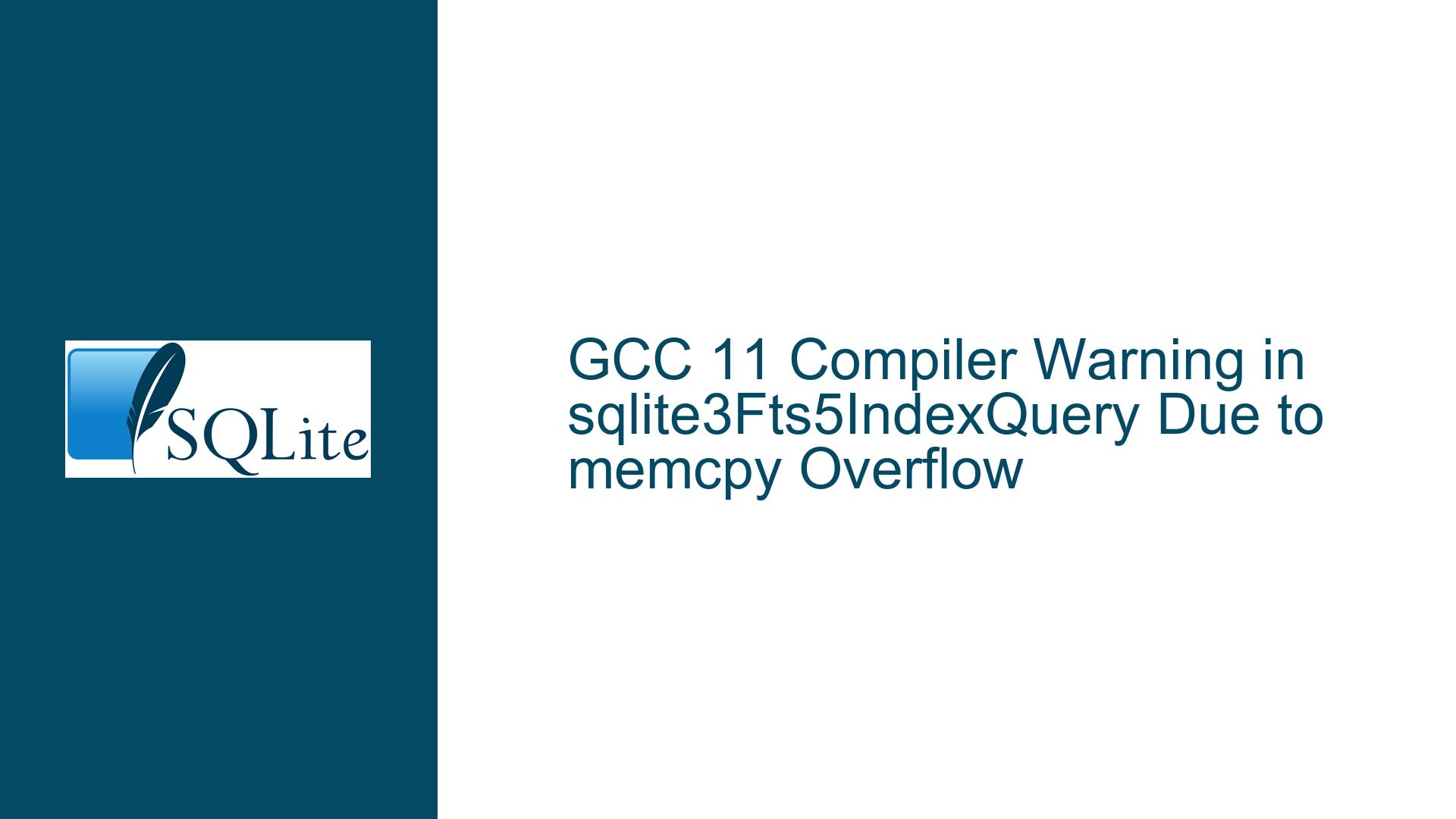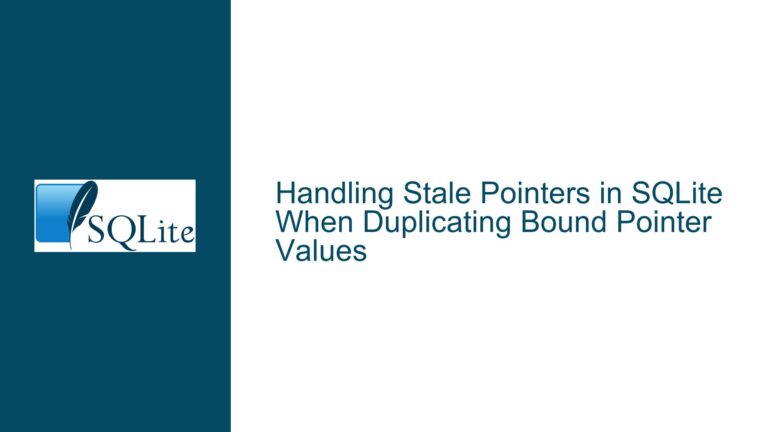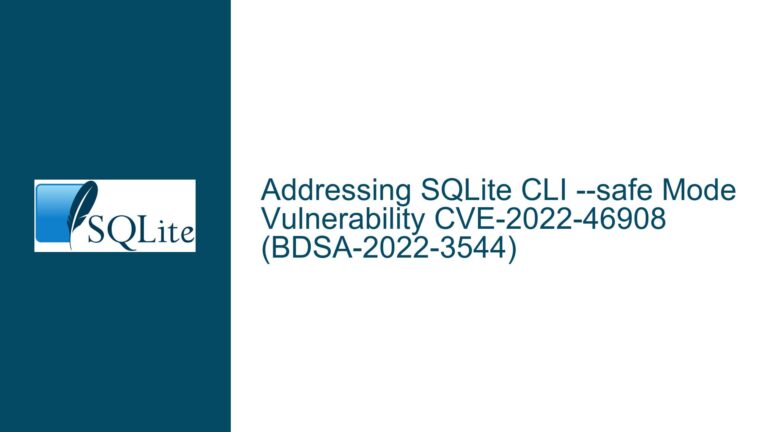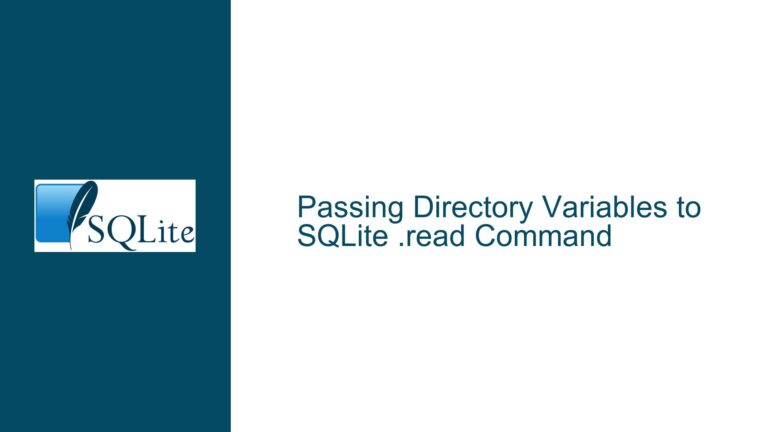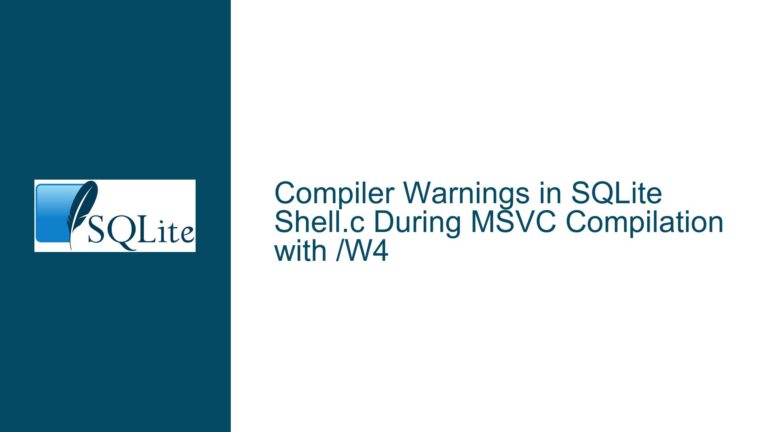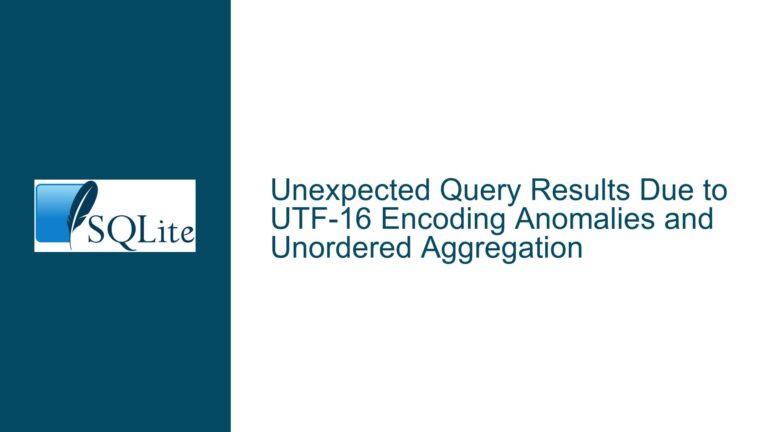GCC 11 Compiler Warning in sqlite3Fts5IndexQuery Due to memcpy Overflow
Issue Overview: GCC 11 Compiler Warning in sqlite3Fts5IndexQuery
The core issue revolves around a compiler warning generated by GCC 11 when building SQLite, specifically within the sqlite3Fts5IndexQuery function. The warning is related to the memcpy function, where the compiler detects a potential buffer overflow due to the specified bound exceeding the maximum object size. The warning message indicates that the memcpy operation is attempting to copy a theoretical maximum size of 18446744073709551615 bytes, which exceeds the maximum object size of 9223372036854775807 bytes. This warning is triggered even though the actual code logic ensures that such a large copy operation would never occur in practice.
The warning is particularly problematic because it suggests a potential security vulnerability or undefined behavior, even though the code is likely safe. The warning arises due to the compiler’s static analysis, which cannot always infer the runtime constraints that prevent the overflow. This issue is exacerbated by the fact that GCC 11 has become more stringent in its checks, leading to false positives in some cases.
The warning manifests in two forms:
- A warning about the specified bound exceeding the maximum object size.
- A warning about writing into a region of size 0, which could overflow the destination buffer.
The issue is not limited to a specific version of SQLite but is tied to the interaction between the SQLite source code and the GCC 11 compiler. The problem was reported by multiple users, including those building SQLite directly and those using it as part of other packages, such as the Go package crawshaw.io/sqlite.
Possible Causes: GCC 11 String Overflow Warnings in memcpy
The root cause of the warning lies in the way GCC 11 performs static analysis on the memcpy function call within sqlite3Fts5IndexQuery. The compiler is attempting to enforce stricter bounds checking to prevent potential buffer overflows, which are a common source of security vulnerabilities. However, in this case, the compiler’s analysis is overly conservative and fails to account for the runtime constraints that ensure the memcpy operation is safe.
The warning is triggered by the following code snippet:
if( nToken ) memcpy(&buf.p[1], pToken, nToken);
Here, nToken is an integer representing the number of tokens to copy, and buf.p is a pointer to the destination buffer. The compiler is concerned that nToken could theoretically be a very large value, leading to a buffer overflow. However, the surrounding code ensures that nToken is always within reasonable bounds, and the buffer is allocated with sufficient space.
The warning is further complicated by the fact that the sqlite3Fts5BufferSize function, which is responsible for allocating the buffer, takes a u32 size parameter. This means that nToken is constrained to be less than UINT32_MAX, but the compiler’s analysis does not fully account for this constraint. As a result, the compiler generates a warning about a potential overflow, even though the actual code logic prevents it.
Another factor contributing to the warning is the inlining of the memcpy function. When memcpy is inlined, the compiler has more visibility into the size of the destination buffer and the size of the data being copied. This increased visibility can lead to more aggressive warnings, especially when the compiler cannot definitively prove that the operation is safe.
Troubleshooting Steps, Solutions & Fixes: Resolving GCC 11 memcpy Warnings in SQLite
To address the GCC 11 compiler warning in sqlite3Fts5IndexQuery, several approaches can be taken. These range from modifying the code to suppress the warning to ensuring that the compiler’s static analysis can correctly infer the safety of the memcpy operation.
1. Add Explicit Bounds Checking
One approach is to add explicit bounds checking to ensure that nToken is within a safe range before calling memcpy. This can be done by adding a check to ensure that nToken is less than UINT32_MAX and that the destination buffer is not NULL. The following patch demonstrates this approach:
if( nToken < UINT32_MAX && sqlite3Fts5BufferSize(&p->rc, &buf, nToken+1)==0 ){
if( nToken && buf.p != NULL ) memcpy(&buf.p[1], pToken, nToken);
}
This patch ensures that nToken is within the valid range and that the destination buffer is allocated before performing the memcpy operation. This should eliminate the compiler warning, as the compiler can now infer that the memcpy operation is safe.
2. Use Compiler-Specific Pragmas to Suppress Warnings
Another approach is to use compiler-specific pragmas to suppress the warning. This can be useful if the warning is a false positive and the code is known to be safe. The following pragma can be used to suppress the warning for the specific memcpy call:
#pragma GCC diagnostic push
#pragma GCC diagnostic ignored "-Wstringop-overflow"
if( nToken ) memcpy(&buf.p[1], pToken, nToken);
#pragma GCC diagnostic pop
This approach is less ideal because it suppresses the warning globally for the specific code block, which could hide other legitimate issues. However, it can be a quick fix if the warning is known to be a false positive.
3. Update to a Fixed Version of SQLite
The issue was ultimately fixed in an unreleased version of SQLite (version 3.38.0). Updating to this version or later should resolve the warning. The fix likely involves modifying the code to ensure that the compiler’s static analysis can correctly infer the safety of the memcpy operation. The specific changes made in version 3.38.0 are not detailed in the discussion, but they likely involve adding explicit bounds checking or other safeguards to prevent the warning.
4. Modify Compiler Flags
Another approach is to modify the compiler flags to reduce the aggressiveness of the warnings. For example, using -O0 (no optimization) instead of -O2 or -O3 can reduce the likelihood of the warning being triggered. However, this approach is not ideal because it can impact the performance of the compiled code. Additionally, it does not address the root cause of the warning, which is the compiler’s inability to infer the safety of the memcpy operation.
5. Use a Different Compiler
If the warning persists and cannot be resolved through code changes or compiler flags, another option is to use a different compiler. For example, Clang may not generate the same warning, or it may handle the static analysis differently. However, this approach is not always practical, especially if the project is tied to a specific compiler or platform.
6. Review and Refactor the Surrounding Code
Finally, it may be necessary to review and refactor the surrounding code to ensure that the compiler can correctly infer the safety of the memcpy operation. This could involve adding additional assertions, modifying the buffer allocation logic, or restructuring the code to make the constraints more explicit. While this approach requires more effort, it can lead to more robust and maintainable code in the long run.
Conclusion
The GCC 11 compiler warning in sqlite3Fts5IndexQuery is a classic example of a false positive generated by overly aggressive static analysis. While the warning suggests a potential buffer overflow, the actual code logic ensures that the operation is safe. By adding explicit bounds checking, using compiler-specific pragmas, updating to a fixed version of SQLite, or modifying compiler flags, the warning can be resolved. In some cases, it may be necessary to review and refactor the surrounding code to ensure that the compiler can correctly infer the safety of the operation. Ultimately, the goal is to maintain the security and reliability of the code while minimizing unnecessary warnings and false positives.
